汉英翻译教程
- 格式:doc
- 大小:37.50 KB
- 文档页数:15
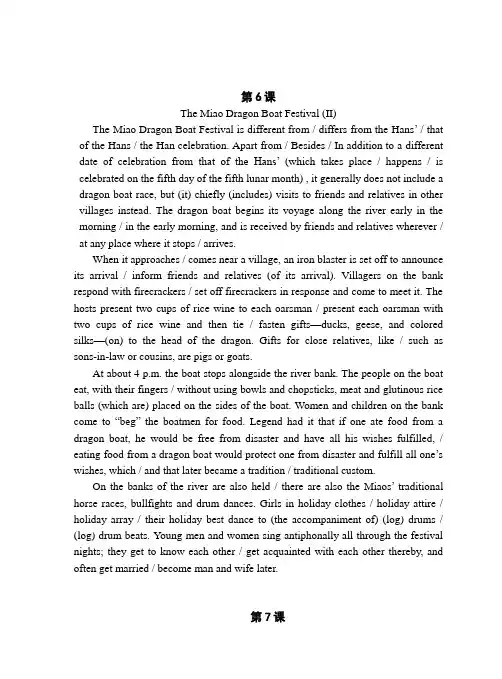
第6课The Miao Dragon Boat Festival (II)The Miao Dragon Boat Festival is different from / differs from the Hans’ / that of the Hans / the Han celebration. Apart from / Besides / In addition to a different date of celebration from that of the Hans’ (which takes place / happens / is celebrated on the fifth day of the fifth lunar month) , it generally does not include a dragon boat race, but (it) chiefly (includes) visits to friends and relatives in other villages instead. The dragon boat begins its voyage along the river early in the morning / in the early morning, and is received by friends and relatives wherever / at any place where it stops / arrives.When it approaches / comes near a village, an iron blaster is set off to announce its arrival / inform friends and relatives (of its arrival). Villagers on the bank respond with firecrackers / set off firecrackers in response and come to meet it. The hosts present two cups of rice wine to each oarsman / present each oarsman with two cups of rice wine and then tie / fasten gifts—ducks, geese, and colored silks—(on) to the head of the dragon. Gifts for close relatives, like / such as sons-in-law or cousins, are pigs or goats.At about 4 p.m. the boat stops alongside the river bank. The people on the boat eat, with their fingers / without using bowls and chopsticks, meat and glutinous rice balls (which are) placed on the sides of the boat. Women and children on the bank come to “beg”the boatmen for food. Legend had it that if one ate food from a dragon boat, he would be free from disaster and have all his wishes fulfilled, / eating food from a dragon boat would protect one from disaster and fulfill all one’s wishes, which / and that later became a tradition / traditional custom.On the banks of the river are also held / there are also the Miaos’traditional horse races, bullfights and drum dances. Girls in holiday clothes / holiday attire / holiday array / their holiday best dance to (the accompaniment of) (log) drums / (log) drum beats. Young men and women sing antiphonally all through the festival nights; they get to know each other / get acquainted with each other thereby, and often get married / become man and wife later.第7课大本钟大本钟是伦敦最有名的地标之一,也是世界上最大的四钟面时钟之一。
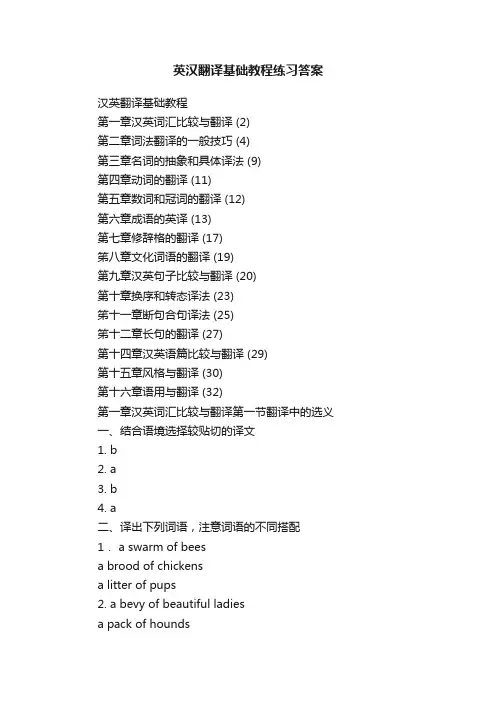
英汉翻译基础教程练习答案汉英翻译基础教程第一章汉英词汇比较与翻译 (2)第二章词法翻译的一般技巧 (4)第三章名词的抽象和具体译法 (9)第四章动词的翻译 (11)第五章数词和冠词的翻译 (12)第六章成语的英译 (13)第七章修辞格的翻译 (17)笫八章文化词语的翻译 (19)第九章汉英句子比较与翻译 (20)第十章换序和转态译法 (23)笫十一章断句合句译法 (25)笫十二章长句的翻译 (27)第十四章汉英语篇比较与翻译 (29)第十五章风格与翻译 (30)第十六章语用与翻译 (32)第一章汉英词汇比较与翻译第一节翻译中的选义一、结合语境选择较贴切的译文1. b2. a3. b4. a二、译出下列词语,注意词语的不同搭配1. a swarm of beesa brood of chickensa litter of pups2. a bevy of beautiful ladiesa pack of houndsa team of ducksa herd of antelopes3. unfailing supportproactive fiscal policymake effective use of overseas resources4. make a phone calltake a taxiknit a woolen sweaterfetch waterplay basketballspray insecticide5. basic wagecapital constructionessential commodityprimary industryfundamental interest三、翻译下列句子,注意画线词语的理解1. The two leaders exchanged views on bilateral relations and issues of common concern2. Party members should listen carefully to the opinions of the general public.3. They offered some suggestions for the revision of the plan.4. Everyone complained against such a practice.5. They had a dispute at the meeting.6. You should follow the doctor's advice.7. They reached a consensus on this issue.8. There is still some unfinished business to settle.9. We have consulted him about the matter.10. Please go back. There is nothing of your concern now第二节翻译中的选词一、翻译下列各句,注意词的选择和搭配。
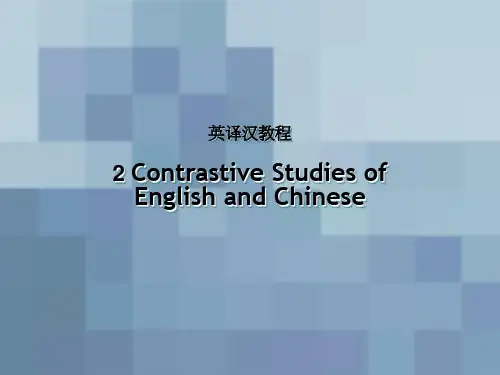
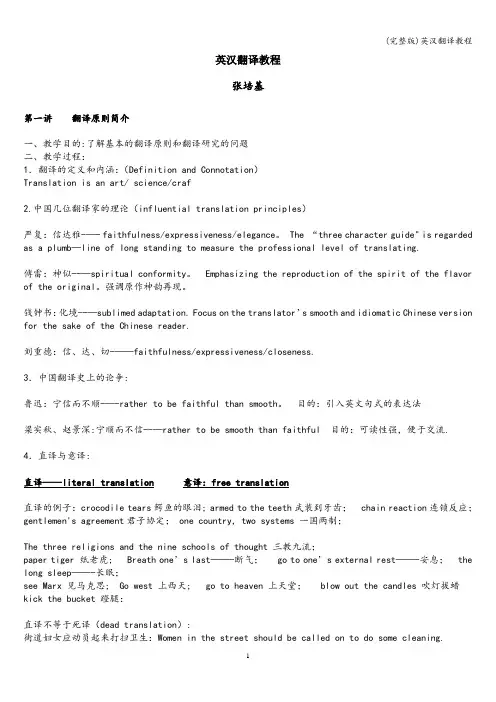
英汉翻译教程张培基第一讲翻译原则简介一、教学目的:了解基本的翻译原则和翻译研究的问题二、教学过程:1.翻译的定义和内涵:(Definition and Connotation)Translation is an art/ science/craf2.中国几位翻译家的理论(influential translation principles)严复:信达雅-—- faithfulness/expressiveness/elegance。
The “three character guide" is regarded as a plumb—line of long standing to measure the professional level of translating.傅雷:神似--—spiritual conformity。
Emphasizing the reproduction of the spirit of the flavor of the original。
强调原作神韵再现。
钱钟书:化境--—sublimed adaptation. Focus on the translator’s smooth and idiomatic Chinese version for the sake of the Chinese reader.刘重德:信、达、切-——faithfulness/expressiveness/closeness.3.中国翻译史上的论争:鲁迅:宁信而不顺-—-rather to be faithful than smooth。
目的:引入英文句式的表达法梁实秋、赵景深:宁顺而不信--—rather to be smooth than faithful 目的:可读性强,便于交流.4.直译与意译:直译—--literal translation意译:free translation直译的例子:crocodile tears鳄鱼的眼泪; armed to the teeth武装到牙齿; chain reaction连锁反应;gentlemen's agreement君子协定; one country, two systems 一国两制;The three religions and the nine schools of thought 三教九流;paper tiger 纸老虎; Breath one’s last——-断气; go to one’s external rest——-安息; the long sleep——-长眠;see Marx 见马克思; Go west 上西天; go to heaven 上天堂; blow out the candles 吹灯拔蜡kick the bucket 蹬腿:直译不等于死译(dead translation):街道妇女应动员起来打扫卫生:Women in the street should be called on to do some cleaning.“In the street" should be replaced by “in the community”.她一大早起床,进城,见到了她的公爹:She got up early, went to the town and saw her public father。
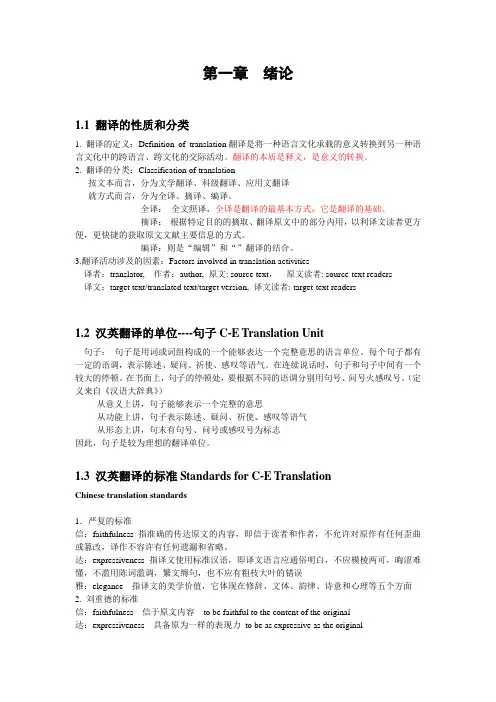
第一章绪论1.1 翻译的性质和分类1. 翻译的定义:Definition of translation翻译是将一种语言文化承载的意义转换到另一种语言文化中的跨语言、跨文化的交际活动。
翻译的本质是释义,是意义的转换。
2. 翻译的分类:Classification of translation按文本而言,分为文学翻译、科级翻译、应用文翻译就方式而言,分为全译、摘译、编译。
全译:全文照译,全译是翻译的最基本方式,它是翻译的基础。
摘译:根据特定目的的摘取、翻译原文中的部分内用,以利译文读者更方便,更快捷的获取原文文献主要信息的方式。
编译:则是“编辑”和“”翻译的结合。
3.翻译活动涉及的因素:Factors involved in translation activities译者:translator, 作者:author, 原文: source text,原文读者: source-text readers译文:target text/translated text/target version, 译文读者: target-text readers1.2 汉英翻译的单位----句子C-E Translation Unit句子:句子是用词或词组构成的一个能够表达一个完整意思的语言单位。
每个句子都有一定的语调,表示陈述、疑问、祈使、感叹等语气。
在连续说话时,句子和句子中间有一个较大的停顿。
在书面上,句子的停顿处,要根据不同的语调分别用句号、问号火感叹号。
(定义来自《汉语大辞典》)从意义上讲,句子能够表示一个完整的意思从功能上讲,句子表示陈述、疑问、祈使、感叹等语气从形态上讲,句末有句号、问号或感叹号为标志因此,句子是较为理想的翻译单位。
1.3 汉英翻译的标准Standards for C-E TranslationChinese translation standards1.严复的标准信:faithfulness 指准确的传达原文的内容,即信于读者和作者,不允许对原作有任何歪曲或篡改,译作不容许有任何遗漏和省略。
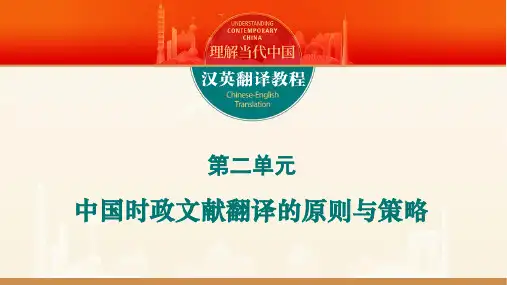
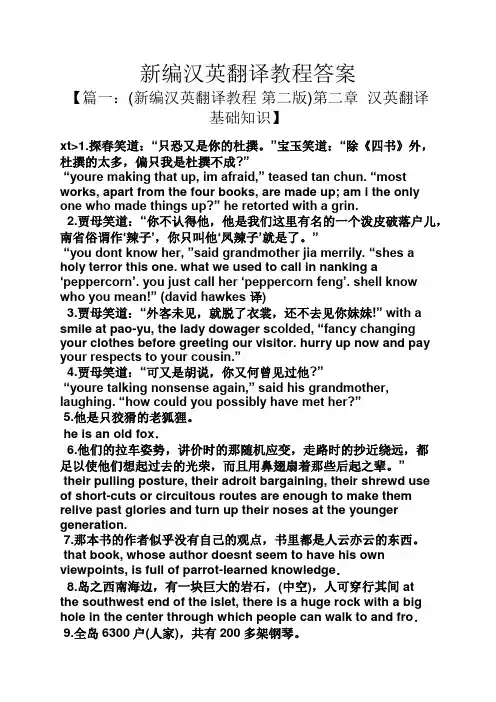
新编汉英翻译教程答案【篇一:(新编汉英翻译教程第二版)第二章汉英翻译基础知识】xt>1.探春笑道:“只恐又是你的杜撰。
”宝玉笑道:“除《四书》外,杜撰的太多,偏只我是杜撰不成?”“youre making that up, im afraid,” teased tan chun. “most works, apart from the four books, are made up; am i the only one who made things up?” he retorted with a grin.2.贾母笑道:“你不认得他,他是我们这里有名的一个泼皮破落户儿,南省俗谓作‘辣子’,你只叫他‘凤辣子’就是了。
”“you dont know her, ”said grandmother jia merrily. “shes aholy terror this one. what we used to call in nanking a‘peppercorn’. you just call her ‘peppercorn feng’. shell know who you mean!” (david hawkes 译)3.贾母笑道:“外客未见,就脱了衣裳,还不去见你妹妹!” with a smile at pao-yu, the lady dowager s colded, “fancy changing your clothes before greeting our visitor. hurry up now and pay your respects to your cousin.”4.贾母笑道:“可又是胡说,你又何曾见过他?”“youre talking nonsense again,” said his grandmother, laughing. “how could you possibly have met her?”5.他是只狡猾的老狐狸。


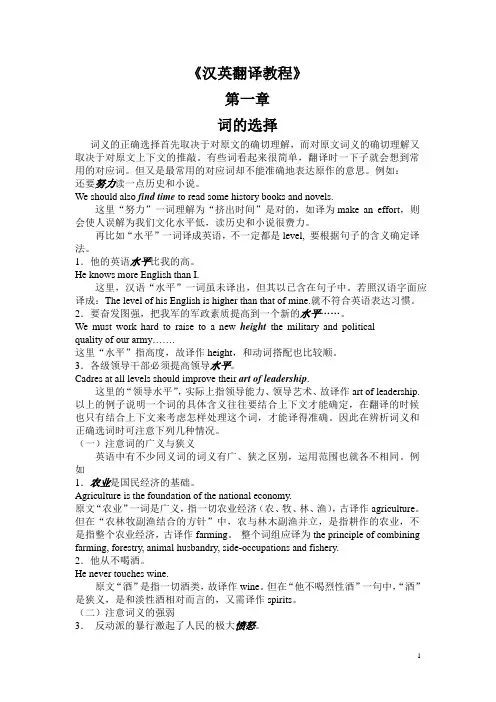
《汉英翻译教程》第一章词的选择词义的正确选择首先取决于对原文的确切理解,而对原文词义的确切理解又取决于对原文上下文的推敲。
有些词看起来很简单,翻译时一下子就会想到常用的对应词。
但又是最常用的对应词却不能准确地表达原作的意思。
例如:还要努力读一点历史和小说。
We should also find time to read some history books and novels.这里“努力”一词理解为“挤出时间”是对的,如译为make an effort,则会使人误解为我们文化水平低,读历史和小说很费力。
再比如“水平”一词译成英语,不一定都是level, 要根据句子的含义确定译法。
1.他的英语水平比我的高。
He knows more English than I.这里,汉语“水平”一词虽未译出,但其以已含在句子中。
若照汉语字面应译成:The level of his English is higher than that of mine.就不符合英语表达习惯。
2.要奋发图强,把我军的军政素质提高到一个新的水平……。
We must work hard to raise to a new height the military and politicalquality of our army…….这里“水平”指高度,故译作height,和动词搭配也比较顺。
3.各级领导干部必须提高领导水平。
Cadres at all levels should improve their art of leadership.这里的“领导水平”,实际上指领导能力、领导艺术、故译作art of leadership. 以上的例子说明一个词的具体含义往往要结合上下文才能确定,在翻译的时候也只有结合上下文来考虑怎样处理这个词,才能译得准确。
因此在辨析词义和正确选词时可注意下列几种情况。
(一)注意词的广义与狭义英语中有不少同义词的词义有广、狭之区别,运用范围也就各不相同。

大学汉英翻译教程(王治奎)1.From English to Chinese (句子)55.I was only joking, but he took it to heart. Just as an old saying goes, “Acasual speaker’s remark may sound deliberate to a suspicious listener.”56.In blaming him for what had happened, you were indeed barking up thewrong tree. He had nothing whatever to do with the affair.57.She is not the kind of person to bear anyone a grudge. She is frank,broad-minded, and outspoken.58.Unique local creations are available in Xi’an, such as the three colored glazedpottery of the Tang Dynasty and terra-cotta figures.59.She couldn’t have come at a better time.60.They preach taking from others, whereas we advocate giving to others. Answers:1.我当时是说着玩儿的,他就认真了。
这不正应了那句话:“言者无心,听者有意”。
2.这件事你责怪他是找错了对象,他与此事毫无关系。
3.她不是那种小心眼儿。
她胸怀宽广、心直口快、光明磊落。
4.到西安你可以买兵马俑、唐三彩。
5.她来得正是时候。
6.他们讲索取,我们讲奉献。
2. From Chinese to English7.缘木求鱼8.大海捞针9.一箭之遥10.守口如瓶11.面如土色12.胆小如鼠13.一模一样14.蠢得像猪15.瓮中之鳖16.倔得像牛17.睡得死沉18.对牛弹琴19.一丘之貉20.掌上明珠21.像落汤鸡22.满腹文章23.聋得像石头24.像没头苍蝇25.无风不起浪26.挂羊头卖狗肉27.聚也不易,散也不易。
王治奎,大学汉英翻译教程,山东大学出版社,2006.6●正在热闹哄哄的时节,只见那后台里,又出来一位姑娘,年纪约十八九岁,装束与前一个毫无分别,瓜子脸儿,白净面皮,相貌不过中人以上之姿,只觉得秀而不媚,清而不寒。
(《老残游记》)Admit the feverish bustling, there appeared on the stage a girl about eighteen or nineteen years old, dressed up just like the former. Her face was shaped like melon-seed. Her beauty was above the average woman---charming but not coquettish, and a charity of complexion but not coldness. (p. 8)●老栓正在专心走路,忽然吃了一惊,远远的看见一条丁字街,明明白白横着。
他便退了几步,寻到一家关着门的铺子,蹩进檐下,靠门停住了。
(鲁迅《药》)Absorbed in his walking, Old Shuan was startled when he saw the crossroad lying distantly ahead of him. He walked back a few steps to stand under the eaves of a shop in front of its closed door. (11)●老王和我算是柳家大院最“文明”的人了。
“文明”是三孙子。
(老舍《柳家大院》)OldWang and I are considered the genteel folks in the compound. Gentility be hanged! (Gentility be blowed! Gentility, the deuce take it!) (33)●现在我在街上摆卦摊儿;好了呢,一天也抓弄个三毛五毛的。
第三章名词的抽象和具体译法第一节名词的抽象译法(p68)粗枝大叶to be crude and careless (with big branches and large leaves)海阔天空to talk with random( with a vast sea and boundless sky)灯红酒绿dissipated and luxurious (with red lights and green wine)纸醉金迷of life of luxury and dissipation (with drunken paper and bewitched gold)单枪匹马to be single-handed in doing sth (with a solitary spear and a single horse)赤胆忠心ardent loyalty (with red gut and heart)无孔不入to take advantage of every weakness (to get into every hole)扬眉吐气to feel proud and elated (to raise the eyebrows and let out a breath)开门见山to come straight to the point (to open the door and see the mountain)大张旗鼓on a large and spectacular scale (to make a great array of flags and drums)风雨飘摇(of a situation) being unstable (the wind and rain are rocking)二.翻译下列句子(1)这是他们夫妻之间的事情,你去插一脚干吗?That’s a business of their own, between husband and wife. Why should you get involved in? (2)别人家里鸡零狗碎的事情你都知道得这么全,真是个顺风耳啊!You know all the bits and pieces of trifles of other families. You are really well informed. (3)这消息让我出了一身冷汗。
汉英翻译教程《汉英翻译教程》第一章词的选择词义的正确选择首先取决于对原文的确切理解,而对原文词义的确切理解又取决于对原文上下文的推敲。
有些词看起来很简单,翻译时一下子就会想到常用的对应词。
但又是最常用的对应词却不能准确地表达原作的意思。
例如: 还要努力读一点历史和小说。
We should also find time to read some history books and novels.这里“努力”一词理解为“挤出时间”是对的,如译为make an effort,则会使人误解为我们文化水平低,读历史和小说很费力。
再比如“水平”一词译成英语,不一定都是level, 要根据句子的含义确定译法。
1(他的英语水平比我的高。
He knows more English than I.这里,汉语“水平”一词虽未译出,但其以已含在句子中。
若照汉语字面应译成:The level of his English is higher than that of mine.就不符合英语表达习惯。
2(要奋发图强,把我军的军政素质提高到一个新的水平……。
We must work hard to raise to a new height the military andpoliticalquality of our army…….这里“水平”指高度,故译作height,和动词搭配也比较顺。
3(各级领导干部必须提高领导水平。
Cadres at all levels should improve their art of leadership.这里的“领导水平”,实际上指领导能力、领导艺术、故译作art of leadership.以上的例子说明一个词的具体含义往往要结合上下文才能确定,在翻译的时候也只有结合上下文来考虑怎样处理这个词,才能译得准确。
因此在辨析词义和正确选词时可注意下列几种情况。
(一)注意词的广义与狭义英语中有不少同义词的词义有广、狭之区别,运用范围也就各不相同。
例如1(农业是国民经济的基础。
Agriculture is the foundation of the national economy.原文“农业”一词是广义,指一切农业经济(农、牧、林、渔),古译作agriculture。
但在“农林牧副渔结合的方针”中,农与林木副渔并立,是指耕作的农业,不是指整个农业经济,古译作farming。
整个词组应译为the principle of combiningfarming, forestry, animal husbandry, side-occupations and fishery.2(他从不喝酒。
He never touches wine.原文“酒”是指一切酒类,故译作 wine。
但在“他不喝烈性酒”一句中,“酒”是狭义,是和淡性酒相对而言的,又需译作spirits。
(二)注意词义的强弱3( 反动派的暴行激起了人民的极大愤怒。
1The atrocities of the reactionaries roused the people to great indignation.这里的“愤怒”含义强烈,故在译文中选用了indignation,而不用anger.4(孙中山是个好人。
Dr. Sun Yet-sen was a man of integrity. 如果译作a good man, 则与这位伟大的革命先行者的身份不相称。
(三)注意词义的褒贬由于人们对事物的态度不同,就会使用含有不同感情色彩的词,或肯定、赞扬、或否定、鄙视。
这种感情色彩应相应地在译文中表达出来,例如: ,就是不要被假象所迷惑。
5(我们应该从这里得出一条经验We should draw a lesson here: Don’t be misled by false appearances.这里的“经验”不是成功的经验,而是从错误或失败中得出的经验,所以译文用了a lesson.6(他们讲唯心论,我们讲唯物论。
They preach idealism whereas we advocate materialism.同是一个“讲”字,译文中一处用preach, 另一处用advocate,一褒一贬,反映了对两种世界观的不同态度。
(四)注意词的语体色彩同义词之间的差别,不仅表现在词义方面,而且也表现在语体色彩方面,例如7(别了,司徒雷登Farewell, Leighton Stuart!这是毛主席批评美国白皮书的一篇文章的标题,译文选用了farewell一词。
若用goodbye,则不能表现出原文所具有的特殊语气和轻蔑口吻。
8(禁止赌博。
Gambling is prohibited.原文“禁止”的语体色彩较为正式,故译作prohibit. 9(这小伙子干活真冲。
This young fellow does his work with vim and vigour.这里的“真冲”是口语体,译者注意了这一点,相应地也用了口语词vim表达。
(五)注意词的政治含义10(“农民”peasant 和farmer都可以和汉语的“农民”或“农夫”相对应。
但是这个词的含义却有差别。
Farmer本指农场的经营者或所有者。
现在也可指以耕种为目的而租入土地的人。
Peasant指住在农村中的小农和以耕种土地为生的劳动者。
英美国家常用farmer指一般农民,而我们常用peasant指一般农民,并与landlord或worker相对而言。
11(“侵略”invasion 和aggression都是汉语“侵略”的对应词。
Invasion指军事入侵,而aggression的含义范围较广,可指政治、军事、经济、文化各方面。
12(“自主”autonomy和initiative都可以和汉语的“自主”相对应。
Autonomy指政治上有自治权利;initiative主要指思想上、行动上有主动性或独立性。
“独立自主”中的“自主”是指后一种意思,所以用initiative.213(打得赢就打,打不赢就走。
Fight when you can win, move away when you cannot.比较:Fight when we can win and run away when we cannot.(六)注意词的搭配汉英两种语言在长期使用过程中形成了各自的固定词组和搭配用法,翻译时必须注意两者的不同,不能把汉语词的搭配用法生搬硬套到英语译文中。
例如:战火扩大:the flames of war expand (应为spread)实现自给自足:achieve self-sufficiency (应为reach)学习知识:learn knowledge (应为 acquire)违反他的意图:violate his intention (应为go against) 严密控制:close control (应为strict/rigid)“啊,好票~”: Ah, good ticket! (应为seat)有资格打世界大战:qualified to fight a world war (应为capable of fighting/can afford to/powerful enough to) 西方舆论纷纷预测:The public opinion in the West predicts one afteranother (应为The Western press has much to say in prediction)强硬政策:Strong policy (应为tough)搭配不单是逻辑上的问题,但大多数还是语言习惯问题。
我们要有意识地去熟悉哪些词经常连用,哪些词不能连用,否则就必然会出现“想当然”和“任意乱套”之类的错误。
不过,语言在发展,有些原来不能搭配的,现在可以了,因为有人在创新。
创新如果站得住脚,久而久之使用的人多了,就成为惯用的语言现象。
注意一些新的搭配,如:ground breaking theory(创新的理论)mental gymnastics (硬性推销)student friend(同窗学友)covert capability (搞情报的能力)第二章词的增补汉译英中的增词现象很多,尤其在译古代汉语或诗词时,由于汉语用词十分经济,译为英语时,如不增加必要的词语而逐字直译,便很令人费解。
如我们常引用的一句诗:“山雨欲来风满楼”,译成英语是:The wind swept through the tower heralds a rising storm in the mountain.原文只有七个字,而英译文则增加到十三个词。
为了保证译文语法结构的完整,可适当增补代词(或名词)、连词、介词、冠词等。
汉语里无主语的句子相当多。
英语则不同,句子一般都需要有主语。
所以在翻译这类无主语句子时有时要采用被动式或There be…结构等办法。
此外,还常常需要根据上下文的意思选择适当的代词(或名词)来补出主语。
例如3(一)代词1(“凭舟极目望去,远处是黛色青山和五彩斑斓的田野。
”Leaning against the boat, you can see dark green mountains and gorgeousfields in the far distance.2(接到你的来信,非常高兴。
I was very glad to have received your letter.物主代词在汉语里远不如英语利用得多。
在英语里凡说到一个人的器官和归他所有的或与它有关的事物时,总要在前面加上物主代词,例如: 3(孩子们天天带午饭到学校去吃。
The children take their lunches to school every day. 4(她用手蒙住脸,好像是为了保护眼睛。
She covered her face with her hand, as if to protect her eyes.汉语句子中,只要从上下文里能够看得清楚,作宾语的代词常常可以省掉。
可是英语就不行,凡及物动词都得有宾语。
因此汉译英时,经常要增补作宾语的代词。
例如:5(把这些故事看完以后,用你自己的话讲一遍。
After you have read these stories, tell them in your own words. 6(请原谅,打断你一下。
Excuse me for interrupting you.(二)连词汉语中的词、词组、分句或句子之间的关系往往通过上下文及语序来表示,较少用连词。
英语通常需要用连词来表明词与词、词组与词组以及句与句的逻辑关系。